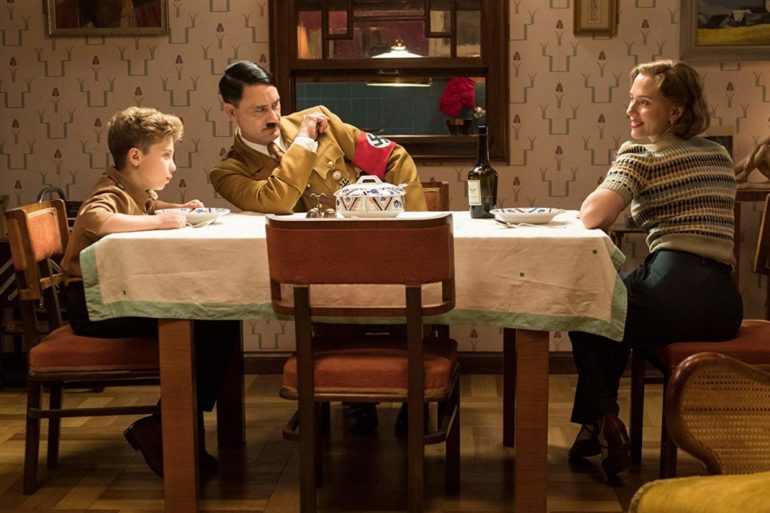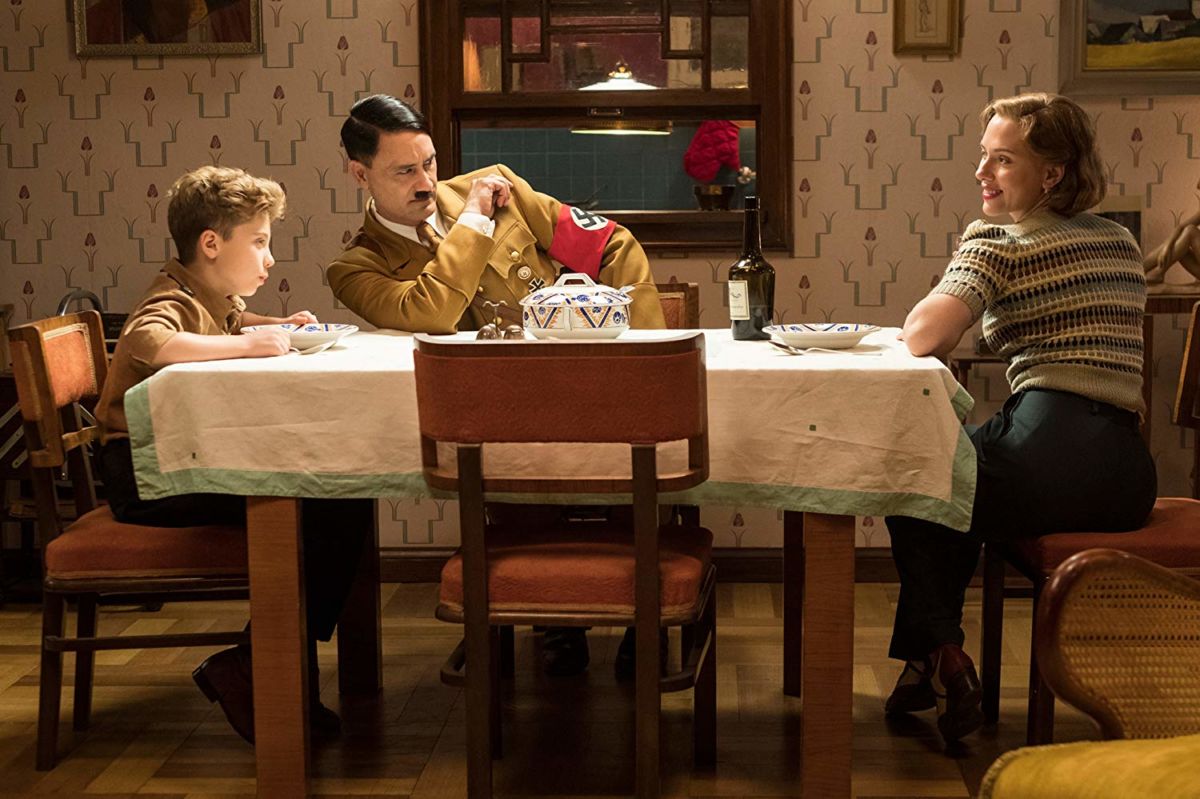There’s a fine line you have to tread when you’re creating something based around topics as sensitive as World War II, Nazi Germany and the Holocaust. This is especially true when you’re invoking that imagery for comedic purposes, as half-Jewish writer and director Taika Waititi is doing for his latest film, Jojo Rabbit, which he calls an “anti-hate satire”. Can you, or even should you, poke fun at this dark chapter in history, and is there any way to do it tastefully?
I’m inclined to say yes; it’s been done many times before (The Great Dictator, The Producers, Look Who’s Back), and Jojo Rabbit succeeds by surprisingly being far more than what it appears on the surface. It’s uproariously funny one moment, tender and saccharine the next, and devastatingly poignant right after. It’s making fun without making light, and a reminder that even though Nazi ideology causes death and destruction, it is, at the end of the day, childish nonsense that deserves to be mocked as often and as ruthlessly as possible.
At the film’s premiere, Waititi commented that “They didn’t say ‘Let’s never forget’ just as a joke. We have to keep finding new and inventive ways to tell this story.” Jojo Rabbit is exactly that – I have never seen a movie quite like it. The closest comparison one could make would be Mel Brooks’ The Producers, whose rapid-fire comic energy is certainly channeled into Jojo’s opening, but the film quickly moves into much more dramatic territory, blending the funny with the horror and the darkness with the light. Even when that tonal balance isn’t completely working, it’s incredible that a film like this exists at all. It’s the best and most ambitious work so far of a filmmaker who only keeps getting better.
Based off the book Caging Skies by Christine Leunens, the film is set in a small German town during the waning days of WWII. Jojo (Roman Griffin Davis) is a young boy who’s ecstatic about his first day at Nazi youth camp, making sure his uniform is pristine and crisp before happily skipping down the street, giving everyone a “Heil Hitler!” on his way. Jojo is a bit of a Nazi fanatic – the walls of his room are covered with propaganda posters and images of Hitler, he gleefully pretends to stab Jews as he plays with his knife, and he’s incredibly gung-ho about a live grenade exercise.
When Captain Klenzendorf, the disillusioned camp leader played by Sam Rockwell who’s continuously being demoted, jokingly says that someone ought to write a book that compiles every outrageous “fact” about Jews, Jojo actually takes it upon himself to write it. This is a kid so well indoctrinated that his imaginary friend is the Führer himself. Played mostly as a slapstick heavy, goofy buffoon, Waititi’s Hitler pops up whenever Jojo is feeling down, giving him advice, reminding him of his duties, and serving as a much-needed confidence boost.
Yet, despite the fact that he’s “massively into swastikas”, Jojo utterly fails at the primary goal of all the hateful rhetoric he loves to parrot: murder. He can’t so much as kill a tiny rabbit, which earns him the nickname “Jojo Rabbit” that the cruel camp leaders use to taunt him. When Jojo returns home to his loving and playful mother, Rosie (Scarlett Johansson), he’s begun to doubt that he’s Third Reich material. The question of whether or not his inert kindness is stronger than his blind nationalism is put to the test soon after, as he discovers that his mother has been hiding a young Jewish girl named Elsa (Thomasin McKenzie) in the attic.
Jojo’s bright and whimsical tone, combined with Waititi’s signature brand of offbeat humor, makes the film come across as a children’s fable of sorts. I’d hesitate to recommend any rated-R movie for a child, but the way that Jojo lays out its themes and subject matter to the point that children can understand it makes me want to suggest that it become required viewing for families. It helps that the violence is never extreme and the humor is never too crude in order to keep its upbeat feel, but Waititi also knows not to shy away from the very real horrors that occur in these totalitarian regimes. These often silent, gray moments of morbidness that offset the rest of the film’s colorful aesthetic are extremely effective, including one in particular that elicited numerous gasps from the audience, myself included.
There’s a difficult balancing act that the director is attempting here, and it’s not always perfect. The back and forth causes some jokes to fall flat, and the sudden shift from sketch-like comedy at the Nazi youth camp to a dramatic Holocaust story can feel a bit jarring at first. Perhaps the conflicting emotions are the point – as you teeter between tears of laughter and tears of sadness, the line becomes blurred. The version of Hitler that occupies Jojo’s head starts off as a cartoonish parody; a way to take a face that’s synonymous with evil and throw tomatoes at it. But as Jojo inevitably begins to learn and question all that he’s been taught to irrevocably believe, the imaginary Adolph turns into something a little more sinister.
Jojo’s mental manifestation of Hitler is an element of the film that’s not present in the book, and Waititi uses it as a way to show the young boy’s inner conflict. Originally a source of reassurance and reaffirmation for him, as Jojo begins to second guess himself and forms an irresistibly sweet bond with Elsa, Hitler reveals himself to be the darker side of the child’s conscience. It’s the part of him that’s been trained since birth to obey and follow the ways of Nazism, what used to be his very identity, and that’s not something that’s easy to rid yourself of. As Jojo starts to break free from the backwards mindset that he’s been conditioned with, a bitter, dejected Hitler pops up to remind him that this is not the way Nazis do business.
The modern-day parallels are unavoidable – fascism is on the rise everywhere, and its leaders are becoming more and more ridiculous, and far more dangerous. Jojo is determined to show where this supremacist ideology eventually leads, not just for the scapegoated victims of genocide, which we’ve seen in film countless times before, but for the average citizens of a fascist country. It calls to mind a line from the first Captain America film: “Many people forget that the first country the Nazis invaded was their own.”
While many people will rightfully say that they’re not interested in seeing a redemption story of sorts for a Nazi, I’d argue that the reason Jojo Rabbit works is because it’s predominantly about a child, one who’s too young to fully understand the things that he’s been raised to unquestionably believe, and thus still has the chance for a genuine change of heart. Jojo, Elsa, and Rosie are all victims of varying degrees to their country’s current regime. Jojo lost out on the chance to be a child – so fueled by blind hatred and duty to the point that he considers someone who doesn’t work as lazy and worthless, even if that someone is a ten year-old kid. Rosie has lost both her husband and daughter to war and fears losing her son next, both physically and mentally. And Elsa, cooped up in a tiny, dark attic, has lost everything.
Waititi has a lot to say about what we’re witnessing today, and knows that having a message solely aimed at the oppressed would be preaching to the choir. So he aims his sights on those everyday people who stand by in the face of violent and cruel fascism, those who may not be comfortable with it, may even be vehemently against it all, but are unsure of what exactly they can do about it. Waititi isn’t really calling for an equally as violent uprising – this isn’t a call to arms, nor is it a way to dump immense guilt onto the unwittingly complicit. All the filmmaker is saying here is to do something, anything, in whatever way you can.
It’s a simple message, but an effective and extremely necessary one. And that’s just it: Jojo Rabbit is a film that feels necessary. Richly layered, impeccably acted, genuinely hilarious, and embedded with such a strong sense of warmth, there’s no other movie like it, and who knows if there ever will be again.
Some of the coverage you find on Cultured Vultures contains affiliate links, which provide us with small commissions based on purchases made from visiting our site. We cover gaming news, movie reviews, wrestling and much more.




